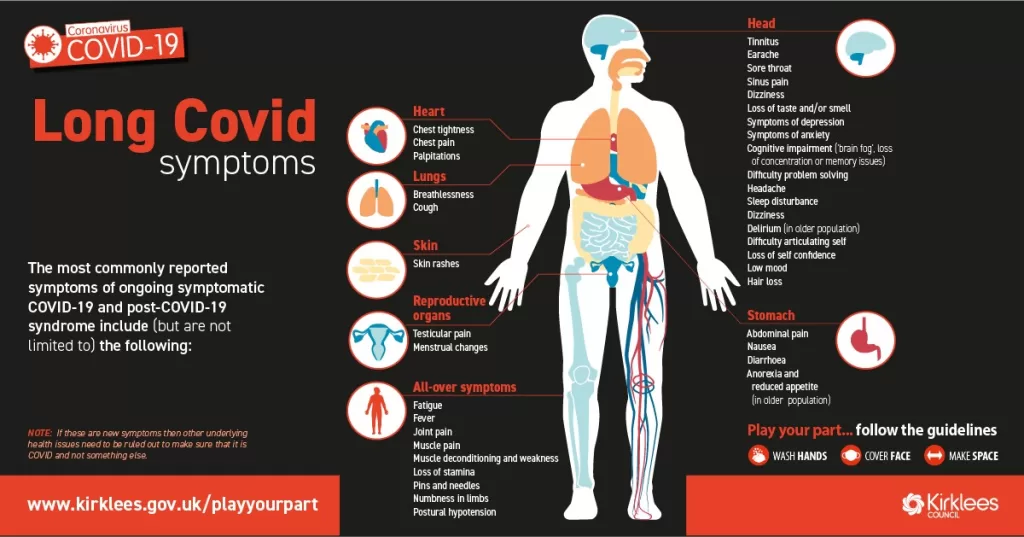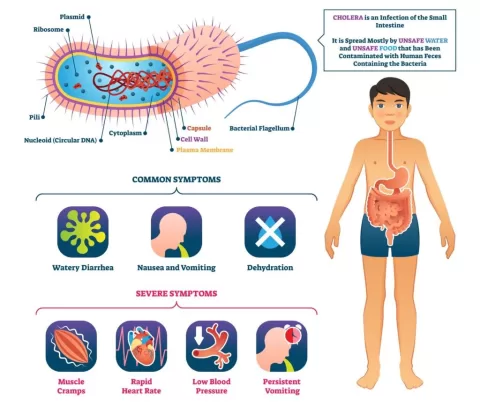Long COVID is a condition that continues to affect millions, with recent statistics indicating that 6.9% of U.S. adults experienced it in 2022. Individuals suffering from long COVID symptoms frequently report a range of debilitating effects, including profound fatigue, cognitive disruptions like brain fog, and persistent breathing difficulties. These chronic COVID effects often lead to significant alterations in daily life, making regular tasks feel insurmountable. Diagnosing long COVID demands a comprehensive understanding of the diverse symptoms presented by patients, as many healthcare providers fail to validate their experiences. While current long COVID treatment options concentrate on managing these symptoms, ongoing research hopes to uncover more effective solutions and address the impact of long COVID on the lives of those affected.
Also referred to as post-acute sequelae of SARS-CoV-2 infection (PASC), long COVID encompasses a range of lingering health issues that arise after the initial COVID-19 illness. This condition can manifest in various forms, impacting overall well-being and daily functioning. Symptoms may vary greatly among individuals, often including severe fatigue, respiratory complications, and cognitive impairments. Diagnosis of this often-misunderstood syndrome is crucial, as healthcare providers must acknowledge the validity of patients’ experiences to ensure appropriate care. Ongoing developments in research aim to better understand and address the long-term ramifications of this illness on the population.
Understanding Long COVID Symptoms
Long COVID presents a spectrum of symptoms that can profoundly disrupt everyday life, significantly impacting the well-being of those affected. Commonly reported long COVID symptoms include persistent fatigue, brain fog, and shortness of breath. Fatigue often feels overwhelming, preventing individuals from resuming their previous activities and jobs, while cognitive challenges can manifest as difficulties in concentrating or remembering information. Moreover, physical symptoms like chest pain and heart palpitations can lead to anxiety, intensifying the psychological burden on patients.
The variability in long COVID symptoms means that each patient’s experience is unique, which complicates diagnosis and treatment. For instance, some may suffer from respiratory issues even months after recovery from the initial COVID-19 infection, while others might wrestle with debilitating headaches or muscle pain. This broad range of conditions illustrates the critical need for nuanced understanding among healthcare providers and the importance of patient validation, as individuals navigate the challenges posed by these chronic COVID effects.
Diagnosing Long COVID: The Path to Recognition
Diagnosing long COVID involves a thorough evaluation of symptoms reported by patients, which can often lead to a challenging healthcare journey. Many individuals seeking relief feel marginalized or dismissed by medical providers, reinforcing the necessity for increased awareness and education regarding long COVID. As understanding of chronic COVID effects continues to evolve, physicians must be prepared to recognize the diverse symptoms presented by patients and validate their experiences, acknowledging the legitimacy of conditions that might not yield clear, immediate medical evidence.
In addition to subjective symptom reporting, ongoing research aims to establish standardized diagnostic criteria for long COVID. This includes identifying clusters of symptoms, such as cognitive dysfunction, fatigue, and respiratory difficulties. Healthcare providers are now encouraged to have open dialogues with patients to develop individualized assessment plans that cater to the varying degrees of long COVID symptoms. By fostering trust and transparency, healthcare systems can better support those grappling with this persistent and multifaceted illness.
Long COVID Treatment: Strategies and Approaches
The treatment landscape for long COVID is still evolving, focused primarily on symptom management to help patients reclaim their lives. In many cases, treatment plans may integrate physical rehabilitation, cognitive therapies, and psychological support to address the multifaceted nature of chronic COVID effects. For instance, rehabilitation may assist individuals in gradually regaining physical strength, while cognitive therapies can offer tools to cope with brain fog and memory impairments, supporting better mental health outcomes.
As clinical trials progress to explore potential long COVID treatment options, patient involvement remains vital in shaping future strategies. Currently, approaches aim to tailor interventions to individual needs, taking into account the diverse symptoms and severity experienced across different populations. Furthermore, ongoing support from healthcare providers can significantly influence recovery journeys, ensuring patients feel empowered and understood while navigating the complexities of their health experiences.
The Impact of Long COVID on Daily Life
Long COVID can leave a lasting impact on a person’s quality of life, extending beyond physical symptoms to influence emotional and psychological well-being. Many individuals find it challenging to return to work or engage in social activities, leading to feelings of isolation and frustration. For those who were previously healthy, the transition to living with debilitating symptoms is not only physically taxing but also emotionally draining, necessitating comprehensive support systems where emotional resources are just as crucial as medical interventions.
Moreover, families and caregivers of long COVID patients often face significant emotional strain, as they navigate the complexities of supporting a loved one with an unpredictable chronic illness. This disruption can lead to shifts in familial roles, added stress in relationships, and a heightened need for community-based support networks. Raising awareness about the pervasive impact of long COVID on daily life is essential, encouraging families and community members to foster understanding and compassion as they support their loved ones through healing.
Validating Long COVID Sufferers: Why Belief Matters
One of the critical barriers faced by individuals with long COVID is the lack of validation from healthcare providers and society at large. Many patients report feelings of disbelief when they describe their symptoms, which can contribute to further emotional distress. This ongoing issue highlights the imperative for providers to listen to their patients empathetically and acknowledge the reality of their suffering, ultimately fostering an environment where patients feel seen and understood.
The importance of validation extends to family, friends, and workplace environments as well. Open discussions about the realities of long COVID and its effects can help reduce stigma and encourage supportive interactions. By recognizing the legitimacy of long COVID symptoms, communities can contribute to a more compassionate atmosphere, improving the overall experience for those navigating this challenging recovery process.
Long COVID and Mental Health: A Complex Relationship
The mental health ramifications of long COVID are a growing concern, with many patients experiencing increased anxiety, depression, and other psychological symptoms as they navigate their chronic illness. This connection highlights the need for comprehensive care that addresses both physical and mental health needs. Access to mental health resources, including therapy and support groups, is critical for individuals coping with the emotional toll of long COVID and for promoting resilience against chronic COVID effects.
Additionally, studies have shown that individuals with pre-existing mental health conditions may be at a higher risk of experiencing severe long COVID symptoms, creating a feedback loop that complicates recovery. Therefore, it is vital for healthcare providers to adopt an integrative approach in treatment plans, considering the interplay between mental and physical health. As understanding deepens, the need for cross-disciplinary cooperation among healthcare professionals can enhance outcomes for patients suffering from the psychological burdens of long COVID.
Future Research on Long COVID: What Lies Ahead?
Ongoing research is crucial in unraveling the complexities of long COVID and its wide range of symptoms. Clinical trials are vital not only for identifying effective treatments but also for understanding the long-term effects of the illness on different populations. Research efforts focusing on the demographic variables related to long COVID, such as age, gender, and baseline health status, can provide invaluable insights to tailor future treatment strategies.
Moreover, researchers are increasingly examining the cellular and biological mechanisms underlying long COVID symptoms, which may lead to groundbreaking discoveries in treatment options. By investigating how the virus impacts various bodily systems, including the nervous system and immune response, scientists hope to develop targeted therapies that address the unique challenges faced by those living with chronic COVID effects. This commitment to advancing knowledge is essential for improving patient care and fostering hope for future recovery.
Advocacy for Long COVID Awareness and Support
Community advocacy plays a pivotal role in raising awareness about long COVID, leading to increased understanding and support for those affected. Advocacy groups are working tirelessly to educate the public, engage with policymakers, and push for better resources and funding for research and treatment. This grassroots mobilization can help shift the narrative surrounding long COVID, emphasizing the urgency of recognizing it as a legitimate health crisis that demands attention from healthcare systems and governments alike.
Furthermore, empowering patients to share their stories can foster solidarity within affected communities, helping to normalize conversations about long COVID and reduce stigma. By creating platforms where individuals can voice their experiences and challenges, advocates contribute to building a supportive environment that encourages healing and resilience. Together, these advocacy efforts underscore the importance of collective action in promoting long COVID awareness and securing the resources necessary for effective treatment.
Frequently Asked Questions
What are the common long COVID symptoms that I should look out for?
Common long COVID symptoms include persistent fatigue, brain fog, shortness of breath, chest pain, heart palpitations, and sleep disturbances. Patients may also experience changes in taste or smell, headaches, and joint or muscle pain. If you experience these symptoms for more than three months after a COVID-19 infection, it may indicate long COVID.
How is diagnosing long COVID conducted by healthcare professionals?
Diagnosing long COVID involves a thorough review of symptoms reported by patients, particularly those that linger after a COVID-19 infection. Healthcare providers look for various physical and mental health issues that may interfere with daily life, ensuring to consider the patient’s medical history and any underlying health conditions.
What treatments are available for managing long COVID?
Long COVID treatment primarily focuses on managing symptoms rather than curing the condition. Options may include physical rehabilitation, cognitive therapy, and medications to alleviate specific symptoms. Healthcare providers usually tailor treatments to the individual’s specific needs. Ongoing clinical trials are also exploring potential long COVID treatments.
How does long COVID impact daily life for those affected?
The impact of long COVID on daily life can be significant, as individuals often face debilitating symptoms like extreme fatigue and cognitive difficulties. This can hinder their ability to work, perform daily tasks, or engage in social activities, creating a substantial emotional and physical burden.
Can anyone get long COVID, or are there certain risk factors involved?
While anyone can contract long COVID, certain risk factors increase susceptibility. These include being a woman, being of Hispanic or Latino descent, having experienced severe COVID-19 illness, having underlying health conditions, being older than 65, or not having received a COVID-19 vaccine.
What steps should I take if I suspect I have long COVID?
If you suspect you have long COVID, consult your healthcare provider to discuss your symptoms and health history. You may need multiple appointments to accurately identify symptoms and confirm a diagnosis. Early consultation is crucial for effective symptom management.
What studies have shown about the mental health aspects of long COVID?
Recent studies indicate that many individuals with long COVID feel dismissed or disbelieved by healthcare providers. There is a strong need for validation and acknowledgment of symptoms, as mental health support is just as critical as medical intervention for these patients.
| Key Aspect | Details |
|---|---|
| Prevalence | 6.9% of U.S. adults reported experiencing Long COVID in 2022. |
| Patient Experience | Patients often face disbelief and dismissal from healthcare providers, highlighting the need for validation. |
| Symptoms | Symptoms range from fatigue, brain fog, and breathing difficulties to sleep disturbances and joint pain. |
| Diagnosis | Recognition of diverse symptoms is crucial for diagnosis. |
| Treatment | Focuses on symptom management; ongoing clinical trials aim to find further solutions. |
| At-Risk Groups | Women, Hispanic and Latino individuals, those with severe COVID-19 illness, older adults, and unvaccinated individuals. |
Summary
Long COVID is a significant health issue affecting millions of individuals worldwide. It is characterized by a range of symptoms that persist for months following a COVID-19 infection, with a notable percentage of affected adults in the United States. The impact of Long COVID is profound, as it not only disrupts daily activities through fatigue and cognitive challenges but also raises serious concerns about the support and understanding patients receive from the healthcare system. Raising awareness and improving management strategies for Long COVID is essential to enhance the quality of life for those affected.
The content provided on this blog (e.g., symptom descriptions, health tips, or general advice) is for informational purposes only and is not a substitute for professional medical advice, diagnosis, or treatment. Always seek the guidance of your physician or other qualified healthcare provider with any questions you may have regarding a medical condition. Never disregard professional medical advice or delay seeking it because of something you have read on this website. If you believe you may have a medical emergency, call your doctor or emergency services immediately. Reliance on any information provided by this blog is solely at your own risk.








